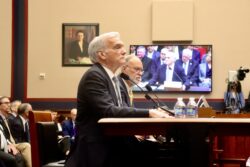Georgetown is undergoing a tough transition?a transition away from the status quo. At the end of this year, Georgetown will lose its provost, Dorothy Brown, its Director of Student Programs Mary Kay Schneider and its Associate Dean of Students Bethany Marlowe. Their replacements will exercise considerable influence over student life?and, in particular, its Catholic identity.
Brown’s replacement, as the chief academic officer of the main campus, will continue to head up the ongoing discussions into changing the school’s curriculum. However this discussion unfolds, it cannot help but deal with the Catholic orientation of a Georgetown education. How would the new provost react, for instance, to future demands to change the University-wide English, Philosophy and Theology requirements? Furthermore, how strongly will he or she feel about Ex Corde Ecclesiae, in which Pope John Paul II calls for tighter Church control over Catholic universities, which?if followed literally?would limit academic diversity?
For the most part, a host of new leaders will decide Georgetown’s future. Earlier this year, John J. DeGioia was inaugurated as the first ever lay president in the University’s 213-year history. DeGioia assumed control over a rapidly changing institution. As the new president, he will oversee the completion of the University’s 10-Year Master Plan and the fulfillment of the Third Century Campaign, both designed to give Georgetown more money, more space, more facilities and?most importantly?more preeminence among top colleges. What’s still unclear, however, is whether this expansion will be one of expanding, or declining, Catholic importance at Georgetown.
It’s difficult now to say which way the University is heading. Though more liberal than most other Catholic universities, it would be wrong to simply dismiss Catholic influence on campus. Vice President for Student Affairs Juan Gonzalez, certainly hasn’t. Earlier this year, Gonzalez spoke in favor of confiscating anonymous student publications that are considered slanderous and inflammatory: “Because we are a Catholic and Jesuit private institution,” he said, “we do have more freedom to control the environment and respond.” More recently, Gonzalez rejected the proposal to create a gay, lesbian, bisexual and transgender resource center, saying it would be incompatible with the University’s Catholic teachings.
DeGioia spoke of the inherent and “dynamic tensions” between the Church and a university in his inauguration speech last October, but it’s too early to tell which way he leans. It would be wrong, though, to read too much into his lay background. As Dean of Students Affairs in the early 1990s, DeGioia originally agreed to give University recognition to H*yas for Choice but then, in response to strong pressure from the Church and other conservative Catholic organizations, he reversed himself. How dynamic and open to change DeGioia actually sees the University’s Catholic identity remains to be seen.
Whichever way Georgetown tilts?more or less Catholic?students need to be more fully included in the discussion. Only three undergraduate students were included on the 12-member search committee that ultimately picked Gonzalez, too few to exercise any influence into who becomes our Vice President for Student Affairs. Students should have an equal voice alongside faculty and administrators in subsequent search processes. Ultimately, any sort of discussion that touches on the issue of Georgetown’s Catholic identity can’t be treated as a higher-up decision, but for what it really is?a fundamental decision about how we live in this community.



